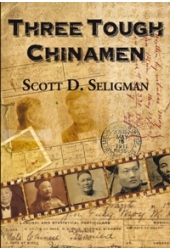Seligman '73 profiles three Chinese-American brothers
New book: Three Tough Chinamen, by Scott D. Seligman ’73 (Earnshaw Books)
The author: A historian, Seligman has lived in Taiwan, Hong Kong, and Mainland China. He has managed a public relations agency in China, served as communications director for a Fortune 50 company, and taught English in Taiwan and Chinese in Washington, D.C. He is the author of Dealing with the Chinese, Chinese Business Etiquette, and co-author of The Cultural Revolution Cookbook.
The book: At the turn of the 20th century, Chinese people who came to the United States faced prejudice. The author examines the obstacles they faced — including the passage of the Chinese Exclusion Act of 1882 — and the lives of the Chinese in America as he tells the story of three brothers who took a stand against injustice, fought bigotry, and advocated for equal rights.
Opening lines of chapter one: “As 62 year-old Moy Jin Kee and his wife of 36 years disembarked from the S. S. Suveric at the Port of Tacoma, Washington on March 11, 1909, they were immediately taken into custody by U.S. Immigration officers. Despite the fact that Jin Kee had lived in the United States for more than half a century, had been granted full citizenship in 1897 by the Circuit Court of Marion County, Indiana and spoke English fluently, the officers felt impelled to undertake a comprehensive investigation of the couple’s right to be admitted, lest they be derelict in their duty to enforce America’s Chinese exclusion laws.”
Review: A critic for The Washington Independent Review of Books called Seligman’s biography of Moy Jin Kee, Moy Jin Mun, and Jin Fuey Moy “meticulously detailed.” “Like most immigrants, the Moys were neither saints nor sinners, but they were industrious, ambitious and scrappy. All three rose to positions of influence and fought for their fellow Chinese. They attained financial success, even though it sometimes meant engaging in questionable activities, and they had to be shrewd to overcome the legal barriers they faced.”













No responses yet